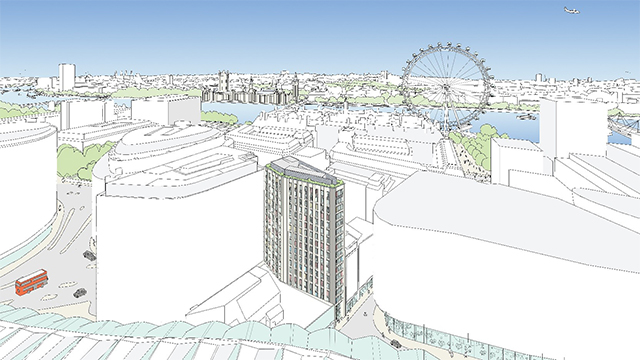It’s very easy to get caught up in the sexiness of flex. Despite the saga that is WeWork, there’s still a general tone in the real estate market that flex can be a saviour. That flex can save the office sector. And that flex is the future of the new work order.
That’s why it’s refreshing to sit down with Natasha Guerra, founder of Runway East, as the business celebrates its 10th anniversary.
Celebrating a decade in business, Guerra could be waxing lyrical about the growth of Runway East and how, from a £100,000 loan secured against her flat in 2014, she has built a firm that will next year deliver some £30m in revenue and an EBITDA of £4.5m.
She’d be well within her rights to spend her time talking about the success she’s had so far. About growing the business from a couple of pop-ups in Derwent London buildings to a portfolio of 12 buildings in London, Brighton, Bristol and Birmingham, with more to come. And about achieving what she thought was her ultimate ambition – making it on to the Times’ 100 Best Places to Work list.
But she doesn’t. Instead, she talks about how flex is a brilliant business to be in but a hard business to get right, especially in today’s market.
What comes across most in talking to Guerra is her forensic focus on sense, finance and cutting through the bullshit.
Cutting through the bullshit came early in Runway East’s journey. In fact, it was a driver for setting up the company.
“I came from a tech background and wanted to create a space for my friends running businesses and thought it would be fun to work in the same space,” she says. “I was running a business in a co‑working space and had found that not to be a very good experience. I was the only female founder in the space and got treated pretty badly by the two ladies running it.”

From that bad experience she moved to a Regus office, which again she found not to be a great experience but did provide a USP for the business she was yet to create.
“We had a brief period where we rented a Regus office,” she says, “and they dinged us for all sorts of fees everywhere we went. That was a big driver to our ‘no hidden fees’ thing.”
Open and honest
That “no hidden fees thing” for Runway East means anyone who buys a desk or desks only pays for that. Broadband, utilities, printing, tea and coffee, water and so on are all included in the price. So too are monthly credits for meeting room space. If you go over those credits – which the firm says is rare – then you pay.
Being open and honest about costs is important to Guerra. The need for business owners to fully understand the financials of an enterprise and for landlords to be better at “looking under the hood” of the numerous flex operators now active in the market comes up in conversation regularly.
It is perhaps because Guerra and her team have grown Runway East organically over the past 10 years using nothing but their own money.
“One of the beauties of growing organically and using funds from the company is that you are much more careful about the decisions you make because it is your money,” she says. “It really matters when it goes wrong. I have made plenty of mistakes and I have learnt the hard way which sites work really well and which sites work less well.”

There’s a humility to Guerra. She clearly has the smarts but she’s quick to question herself. Although she admits that after a decade in the game she is starting to trust her instinct – and method – a lot more.
She recounts experiences from the early days of Runway East, when the business was up against the venture capitalist-funded giants such as WeWork.
“I remember going to meetings and people saying ‘WeWork is amazing’, while I’m thinking that it doesn’t stack up. If you put its numbers in our model, it was clear it was going to fall apart,” she says.
She adds: “My biggest learning from that is you’re not as stupid as you think you are.”
Now, while WeWork licks its wounds and nurses losses, Runway East is steadily growing, adding sites, revenue and profit.
Margin matters
But making flex profitable is not an easy business, she says. While the big bucks from the venture capital funds may be less prevalent, competition now comes in the form of landlords launching their own flex businesses and through a war on margin.
“Five years ago, we were competing with the venture-funded model – the WeWorks and all these people that have raised absolutely bananas amounts of money and pretended they are going to build a tech company out of a real estate business. Now we are competing with the low-margin model, which is its own challenge,” she says.
That challenge means Runway East has to be on point with the spaces and locations it chooses and has to be confident in the path it has chosen.
“I think you can expand really fast and aggressively, but I haven’t seen anyone do that in the UK successfully. Slow and steady in this market works,” says Guerra.
For her it’s about getting the density of space right. As an operator, she has high fixed costs, so every extra desk she can make work in a space is extra income, a little extra on the bottom line.
“If you rush to open spaces and you rush to do the layouts and you rush to do all of these things, you don’t get the time to refine those models,” she explains. “We have spent a lot of time honing it, so we know exactly what works and what doesn’t. We have a blueprint of what we are looking for and what we need.”
She adds: “I am now at place where I know what I know, and 40% of the space being in a dark corner with no windows just doesn’t sell and there isn’t another company out there that is going to find a way to sell that. They are just going to end up in trouble.”
Landlord advice
What troubles Guerra is that some landlords are getting burnt by operators which think they can make those spaces work. She gets it. If a building is stranded, just getting some rent in is better than nothing, but she wants landlords to do a bit more financial due diligence on the operators flexing their muscles in the market today.
“People do not look under the hood enough and I think that is a big mistake,” she says. “They don’t ask good questions. I could go to a landlord and say I’m at 100% occupancy at all of my buildings. And they would just take that.
“Occupancy does not mean financial success. Occupancy and desk rate is meaningless because we are all at different densities. What return did your landlord get is a good question.”
She adds: “There should be a lot more standardisation in the way that landlords are evaluating operators and track record should count for more. Returns, not occupancy rates, should matter. We can all give away desks to get 100% occupancy – and lots do.”
It’s good advice for landlords but also a good pitch for Runway East, of course.
She promises – and says she delivers – on average a return of 30% above net effective rents for her landlord partners. And it is that track record, that financial return, that she wants landlords to take account of as Runway East embarks on its next phase of growth.
Building clusters
As EG meets Runway East, it reveals it has signed its 12th deal, a new 12,000 sq ft space on Borough High Street, SE1. The 20-year management agreement on the space is its second deal with Peer Group, the other being 24,000 sq ft at Chapter House, less than a mile away at Crucifix Lane.
The new operation will open in early 2025 following a £1m fit-out and will make Runway East one of the largest flex operators in SE1.
For Guerra, signing multiple deals with the same landlord is recognition of the product working and of that due diligence paying off. Alongside Peer Group, Runway East also has multiple sites with Soho Estates and GPE.

She is also a fan of having clusters of Runway Easts.
“Landlords don’t always get it,” she explains, “but it is great for economies of scale. From our perspective, it makes it more helpful. We think of clustering as a strong positive and we would much rather be big in a few concentrated areas that have a dispersed portfolio.”
It also enables Runway East to have better control over pricing, she adds, returning back to that need to be focused on the financials. “It’s much better to be competing with ourselves,” she says.
So what makes the perfect site for Runway East and where does Guerra expect those clusters to be as she develops the business over the next 10 years?
The number one requirement is location. High occupancy matters for Runway East so it needs to be in high-trafficked and well-established areas – Zone 1 locations in London and, as it expands, the major regional cities.
For Guerra, local knowledge of an area is vital too. The firm is strong in Bristol because she knows the area well having studied there. The group has boots on the ground at its new site in Birmingham and will be looking to do the same in Leeds and Manchester as it seeks to expand further into the regions.
The ultimate UK ambition is 20 sites, with a 60/40 split between London and the regions. Then, maybe, the business will start to venture further afield. But not if it hasn’t got that knowledge and a sound financial plan.
Mantras for success
It’s here that Guerra delves into the handful of mantras she has borrowed from GPE – one of the first major landlords she established a joint venture partnership with. Among her favourites are “stick to your knitting” – aka don’t invest in places or things you don’t understand – and “you make money when you buy, not when you sell”.
“The lesson there is that in this industry it is all about the deal that you do on day one and if you take the site at bad economics, you have no hope of a successful product,” says Guerra. “If you don’t do a good deal at the outset, brand doesn’t matter, none of that stuff matters. You’ve got to get the economics right. That is the most important thing people need to learn. That’s why the fast expansion thing often doesn’t work. You are taking over-priced deals and there is no margin.”
And margin matters for a business like Runway East. The firm has money in the bank to spend on expansion, its challenge is finding the right site, doing the right deal and getting the economics right so it can sustainably grow the business for another decade or more.
Guerra says: “For us, the challenge is finding the right locations where we think the numbers stack up. There is a plethora of operators that are willing to take sites on numbers we don’t think make sense.
“Maybe I will find out that they know something I don’t,” she adds, “but at this point in my career, I’m doubting it.”
And so she should. She did call WeWork after all.
All photos © David Jensen
Send feedback to Samantha McClary
Follow Estates Gazette











